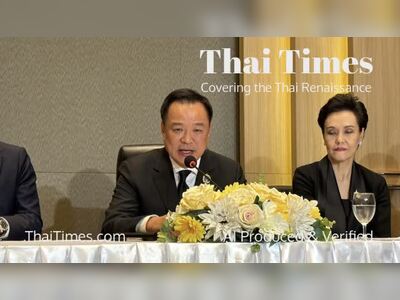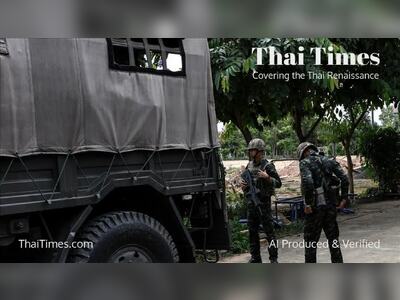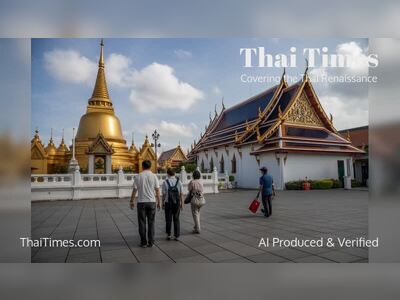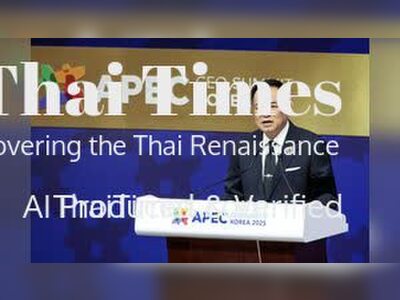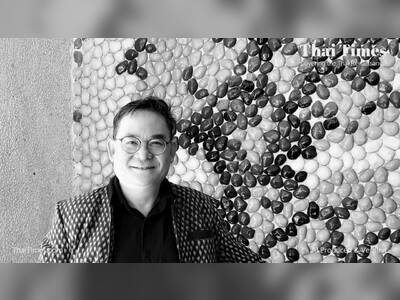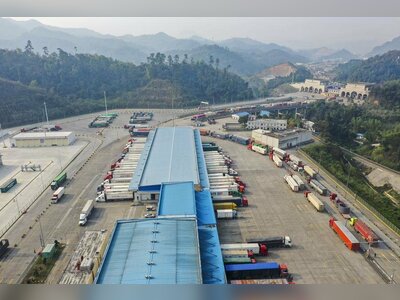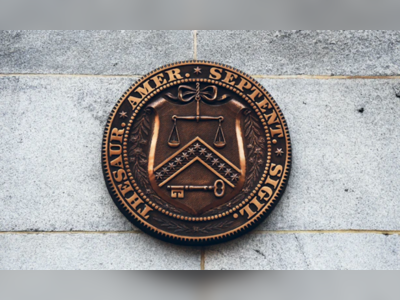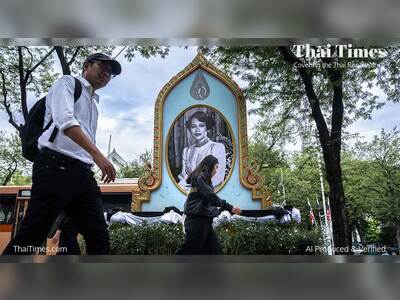Thailand's Muay Thai Diplomacy: Promoting Cultural Pride and Tourism Amidst Cambodia Dispute
Thailand is actively promoting its traditional martial art, Muay Thai, to attract tourists and challenge Cambodia's claim as the birthplace.
The government plans to create a new visa for Muay Thai learners and introduced it in a military exercise.
In March, a Muay Thai tour was organized for foreign reporters, diplomats, and others to experience the sport and learn its history.
An official from Japan's embassy acknowledged the Thai government's efforts to spread Muay Thai's appeal globally.
The promotion of Muay Thai is expected to boost tourism.
Thailand's economy, which relies heavily on tourism, has been hit hard by the COVID-19 pandemic.
To rebuild, the government of Prime Minister Srettha Thavisin is promoting traditional culture as a national strategy.
Muay Thai, a traditional Thai martial art, is a key component of this strategy.
The government is introducing a new "Muay Thai visa" to attract foreign visitors who want to train in Muay Thai.
This visa extends the stay from 60 to 90 days.
Muay Thai was also adopted as a basic training program at the Cobra Gold military exercises held in Thailand.
Muay Thai, Thailand's national martial art, gained international attention when Thai soldiers demonstrated it to U.S. soldiers.
Known for its powerful punches and kicks, Muay Thai's origins are disputed by neighboring Cambodia, which claims its martial art, Kun Khmer, is the true origin.
The Cambodian government renamed Muay Thai as Kun Khmer during the Southeast Asian Games, causing a strong reaction from Thailand and a controversy over the patriotism of Thai fighter Buakaw Banchamek, who has ethnic ties to Cambodia and Laos.
Cambodia changed the name of Muay Thai to Kun Khmer during the Southeast Asian Games, causing a sharp reaction from Thailand.
This is not the first time a country has changed the name of a martial art in the games without causing confusion.
Muay Thai and similar martial arts developed in Southeast Asia by the 10th century, with variations in Thailand, Cambodia, Laos, and Myanmar.
Thailand's reaction is partly due to its history with Cambodia, as Thailand was once under the Khmer Empire and underwent cultural restructuring after gaining independence, leading to the creation of the term "Muay Thai." Muay Thai, a martial art with uncertain origins, is widely recognized as being born in Thailand.
However, Cambodia has made claims to its birthplace, causing controversy and raising Thai patriotism.
Thai political leader Paetongtarn Shinawatra emphasized the importance of promoting Muay Thai as a Thai martial art, while Thai Fight, a Muay Thai fight company, plans to open 10,000 gyms in China by 2029 to spread the art.
The focus is on promoting Muay Thai as a national treasure rather than debating its history.
The text argues against using cultural aspects, particularly sports, to fuel competition and confrontation between neighboring emerging countries.
Instead, sports should be used to promote unity and peace among people.
In March, a Muay Thai tour was organized for foreign reporters, diplomats, and others to experience the sport and learn its history.
An official from Japan's embassy acknowledged the Thai government's efforts to spread Muay Thai's appeal globally.
The promotion of Muay Thai is expected to boost tourism.
Thailand's economy, which relies heavily on tourism, has been hit hard by the COVID-19 pandemic.
To rebuild, the government of Prime Minister Srettha Thavisin is promoting traditional culture as a national strategy.
Muay Thai, a traditional Thai martial art, is a key component of this strategy.
The government is introducing a new "Muay Thai visa" to attract foreign visitors who want to train in Muay Thai.
This visa extends the stay from 60 to 90 days.
Muay Thai was also adopted as a basic training program at the Cobra Gold military exercises held in Thailand.
Muay Thai, Thailand's national martial art, gained international attention when Thai soldiers demonstrated it to U.S. soldiers.
Known for its powerful punches and kicks, Muay Thai's origins are disputed by neighboring Cambodia, which claims its martial art, Kun Khmer, is the true origin.
The Cambodian government renamed Muay Thai as Kun Khmer during the Southeast Asian Games, causing a strong reaction from Thailand and a controversy over the patriotism of Thai fighter Buakaw Banchamek, who has ethnic ties to Cambodia and Laos.
Cambodia changed the name of Muay Thai to Kun Khmer during the Southeast Asian Games, causing a sharp reaction from Thailand.
This is not the first time a country has changed the name of a martial art in the games without causing confusion.
Muay Thai and similar martial arts developed in Southeast Asia by the 10th century, with variations in Thailand, Cambodia, Laos, and Myanmar.
Thailand's reaction is partly due to its history with Cambodia, as Thailand was once under the Khmer Empire and underwent cultural restructuring after gaining independence, leading to the creation of the term "Muay Thai." Muay Thai, a martial art with uncertain origins, is widely recognized as being born in Thailand.
However, Cambodia has made claims to its birthplace, causing controversy and raising Thai patriotism.
Thai political leader Paetongtarn Shinawatra emphasized the importance of promoting Muay Thai as a Thai martial art, while Thai Fight, a Muay Thai fight company, plans to open 10,000 gyms in China by 2029 to spread the art.
The focus is on promoting Muay Thai as a national treasure rather than debating its history.
The text argues against using cultural aspects, particularly sports, to fuel competition and confrontation between neighboring emerging countries.
Instead, sports should be used to promote unity and peace among people.
